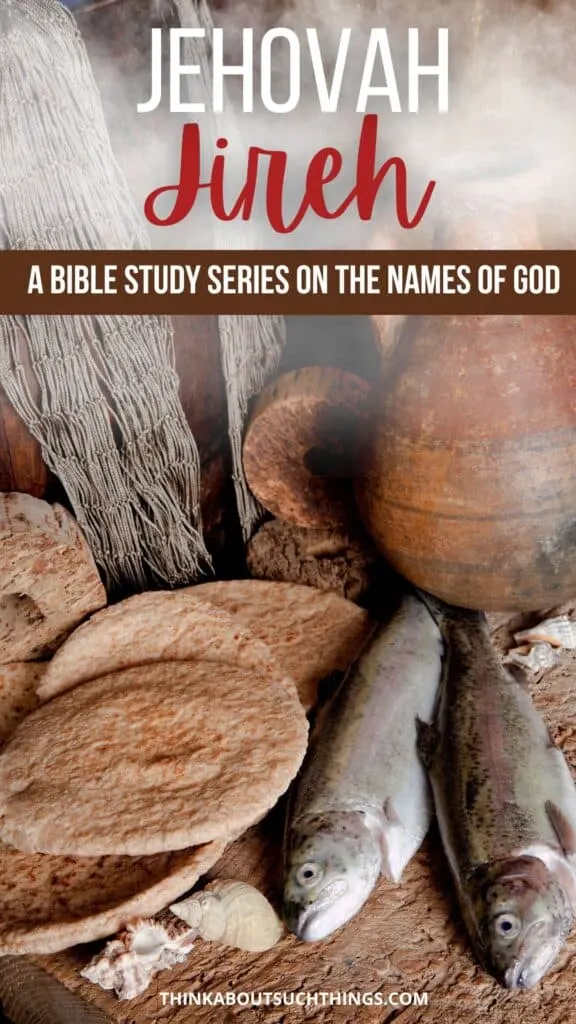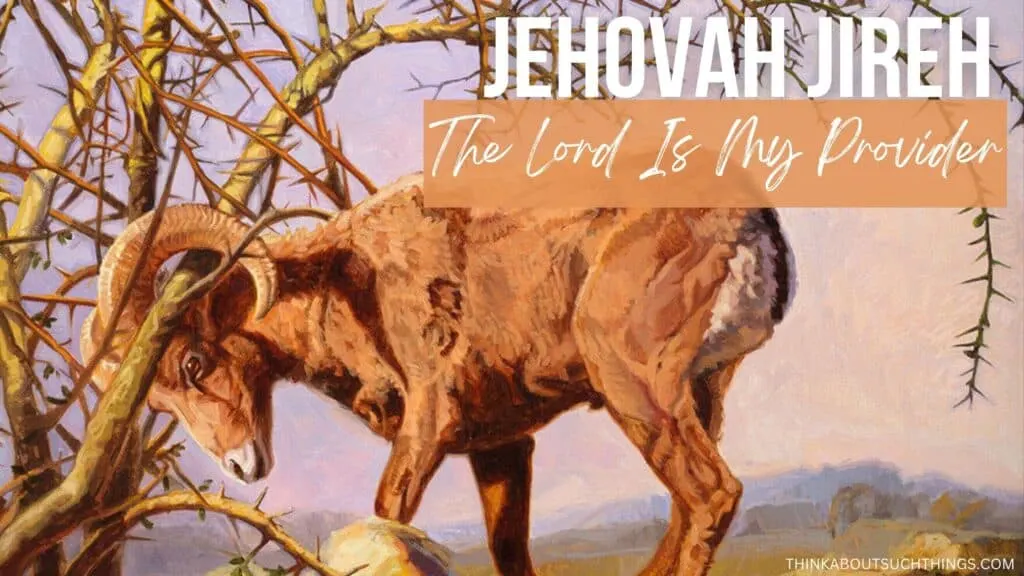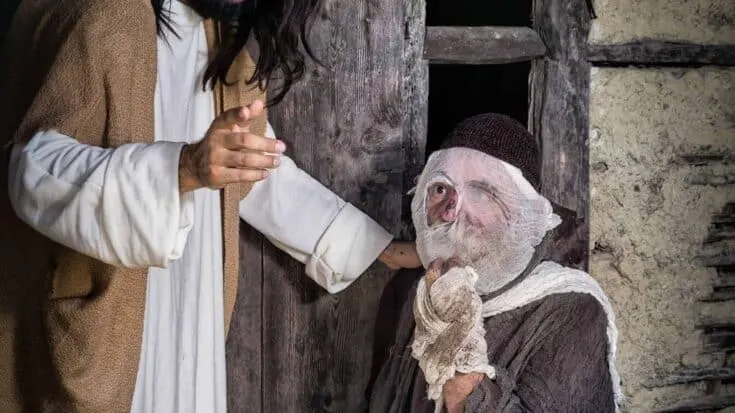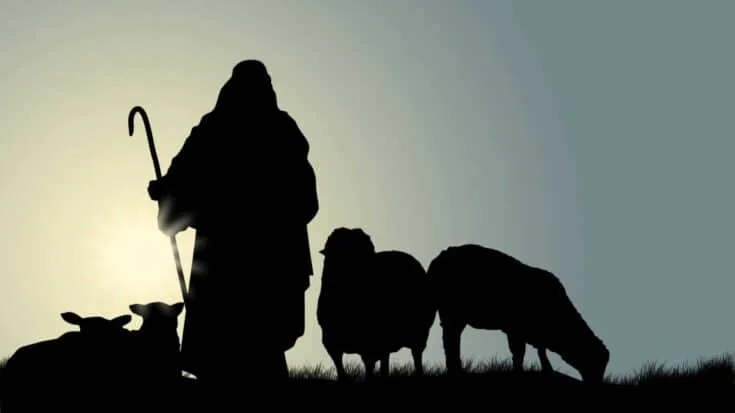In this article, we will continue our study of the names of God. This time we will be looking at Jehovah Jireh, what it means, and how we can learn that Lord is our provider. So, grab your Bible, and let’s dive in…
There are lots of titles we call people and ourselves. For example, I’m a sister, a daughter, an aunt, a writer, a minister, a leader, and many more things. And I’m sure you have a list of titles or names for yourself.
These names reveal different aspects of who you are to others around you. You may show different attributes in one role than in the other, but you are always you. Likewise, God reveals various aspects of His nature to us in the Bible so that we can get to know His character.
Through different encounters, God is given different names that highlight His nature. Despite these different names, He is still one God. By using different names, we learn whom God wants to be in our lives, so we may better understand Him.
The different names of God help us grow in our understanding of Him and develop a stronger relationship with Him.
The Bible is so rich in meaning that we are able to get many layers of understanding each time we delve into it. In Genesis, we read about Abraham’s encounter when he named a mountain Jehovahjireh.
THE KJV – Genesis 22:14
And Abraham called the name of that place Jehovahjireh: as it is said to this day, In the mount of the Lord it shall be seen.
THE NIV- Genesis 22:14
So Abraham called that place The Lord Will Provide. And to this day it is said, “On the mountain of the Lord it will be provided.”
Let us delve into the meaning of Jehovah Jireh and learn how the aspect God shows us in this name is relevant to us today.

Table of Contents
What Does Jehovah Jireh Mean? A Look At The Hebrew
To understand the meaning of the name Jehovah Jireh, we need to look at the Hebrew meaning.
Jehovah is the name of the LORD GOD (Written in our Bibles in all capital letters.). There are no vowels in the Hebrew text, and Jehovah is only written as the tetragram Yod, He, Vav, He.
יְהֹוָה Yᵉhôvâh, yeh-ho-vaw’; from H1961; (the) self-Existent or Eternal; Jeho-vah, Jewish national name of God:—Jehovah, the Lord. Compare H3050, H3069.
Out of reverence, the name of God is not spoken by the Jewish people, and they use Adonai as an alternative.
Jireh means to see or to look at. At first glance, that does not help us understand this new given name of God and the characteristic He wants us to learn through this name. Idiomatically in Hebrew, it means “to see to it.” In other words, God will see to it or look after the need.
רָאָה râʼâh, raw-aw’; a primitive root; to see, literally or figuratively (in numerous applications, direct and implied, transitive, intransitive and causative):—advise self, appear, approve, behold, × certainly, consider, discern, (make to) enjoy, have experience, gaze, take heed, × indeed, × joyfully, lo, look (on, one another, one on another, one upon another, out, up, upon), mark, meet, × be near, perceive, present, provide, regard, (have) respect, (fore-, cause to, let) see(-r, -m, one another), shew (self), × sight of others, (e-) spy, stare, × surely, × think, view, visions.
When we understand the meaning in this context, we understand Jireh to mean that God sees and takes care of the need. According to Genesis 22:14 in the Strongs Concordance, we see the full title Jehovahjireh. This is where we see the connection to the Hebrew word, rā’â.
יְהֹוָה יִרְאֶה Yᵉhôvâh yirʼeh, yeh-ho-vaw’ yir-eh’; from H3068 and H7200; Jehovah will see (to it); Jehovah-Jireh, a symbolical name for Mount Moriah:—Jehovah-jireh.
God will see to it! I love that!
Now, to understand this name of God more, we need to learn about the setting in which God reveals this name to us.
How Did Jehovah Jireh See To Abraham’s Needs?

We read in Genesis 22 how God tests Abraham’s faith. God asks Abraham to offer his son Isaac as a burnt offering.
This is an shocking thing to ask! Abraham waited one hundred years for Isaac to be born, and God had promised that through Isaac, Abraham would leave a bloodline as numerous as the stars. I’m sure a million questions rolled through Abraham’s mind, yet he decided to be faithful to God and trust Him.
The Bible tells us Abraham arose, started preparing, and then traveled to Moriah with his promised son Isaac, two young men, and the wood to offer Isaac to the Lord.
Mount Moriah
To understand Abraham’s obedience and faith, we must look more closely at the mountain’s name where God led Abraham. God was foreshadowing His provision when He told Abraham to offer Isaac on Mount Moriah.
The name Moriah means chosen by Jehovah, but it is derived from two words:
God was already reassuring Abraham that He was looking out for him despite the difficulty of the test.
Next, we must look at Genesis 15 to understand Abraham’s faith in this test. In this chapter, we read about God’s promise to Abraham that he and Sarah would have a son of their own, and from this son would eventually arise a great nation.
A Covenant Between God And Abraham
These were not mere words. God ratified this promise with a covenant.
But let’s take a step back and look at what a covenant is…
A covenant is a binding contract that either party can call upon. It is not merely a legal contract. A covenant requires a relationship.
The strength of a covenant means that either of the parties can call on the help of the other party, and help cannot be denied. Abraham knew he could not deny God’s request. He also knew if he asked God to raise Isaac to life again, God would do so because of their covenant.
Throughout the account of Abraham going to Moriah, we see Abrahams’s faith displayed. In Genesis 22:5, he tells the young men to wait for them, as he and Isaac would go and worship and then return.

Abraham spoke of worship at a time when fear and doubt could have been crippling him. He also declares in faith that both of them will return.
We see the same confidence in Genesis 22:8, where Isaac asks Abraham where the lamb for the offering was. Abraham assures Isaac that God will provide a lamb for the offer.
In this verse, the word for provide is rā’â.
Abraham states that God would look after their needs and provide everything needed for the situation.
And that’s exactly what God did! He became Jehovah Jireh for Abraham and Issac.
I also want to share that Issac wasn’t a little boy when this test took place. Many historians and theologians believe he was in his mid-teens to early twenties. This really changes the dynamics of the story.
Does Jehovah Jireh Still Provide For Us Today?
We have so many promises in the story of Abraham. We can see an example of a great man of faith but also a man that is like us and makes mistakes.
Through all of this, God still honors His promise to Abraham and teaches us about His faithfulness to us.
When Abram and Sarai did not see God’s promise of a child come to life despite many years passing, they took matters into their own hands and tried to help God’s plan along.
Sarai’s handmaid Hagar conceived a child by Abram, but Sarai soon regretted her plan. She treats Hagar harshly, and Hagar flees into the wilderness.
Here the angel of the Lord finds Hagar and assures her of a future under God’s care. Despite Ishmael being conceived because of Abram and Sarai’s impatience, the angel speaks a similar blessing over his life.
He assures Hagar that Ishmael will also become a big nation. God honors His promise even though it was not His plan for Abraham.
Hagar acknowledges in Genesis 16:13 that God has seen and cared for her. The Hebrew word for see here is slightly different but has rā’â as the root word.
Then she called the name of the Lord who spoke to her, You-Are-the-God-Who-Sees; for she said, “Have I also here seen Him who sees me?” – Genesis 16:13
We see here that even when we make mistakes, God is there looking to make way for us. He sees us in every situation, whether we act in rebellion or obedience, and Jehovah Jireh provides opportunities for us to be drawn back to Him.
In an even greater sense, the story of Abraham leading Isaac up the mountain to be offered foreshadows God’s redemptive plan to save us all. We may often interpret God’s name – Jehovah Jireh, in the light of God’s faithful provision of our everyday needs, but there is so much more.
Because God searched Abraham’s heart and found him willing to offer his entire inheritance, name, future, and hope, God, through His covenant, was willing to do the same for Abraham!
We see the similarities between Isaac carrying the wood for the offering on his back and Jesus carrying the cross on which He would be sacrificed.
God provided a ram as a replacement offering so that Isaac did not need to die. In His mercy toward us, God has also offered His blameless Son so that we may live and have a future and hope of eternal life.
We can have an eternal inheritance and a relationship with God because of His new covenant ratified with the Blood of His Son on the cross.
When you look at it this way God doesn’t just provide for the little stuff, but provides everything we will ever truly need in Christ!
In our lives today, Jehovah Jireh means that God looks after us. God sees our needs and hears our concerns and fears.
Nothing takes Him by surprise. We do not take our concerns to Him in prayer because He didn’t know about them. We pray to God to acknowledge that He is the source of all we need. He sees us and sees to the provision of all we need according to His riches in Glory.
And my God shall supply all your need according to His riches in glory by Christ Jesus. – Phillippians 4:19
God is our Jehovah Jireh. Even when we do not receive what we think we need, God provides what He knows is best for us. His plans are above our plans, as His thoughts are above our thoughts. He provided a plan for eternal salvation before we even knew to ask Him into our lives.
More On The Names of God
I’ve been working on a series on the names of God, and if you would like to learn more, check them out below!
The Names of God

Melissa is a passionate minister, speaker and an ongoing learner of the Bible. She has been involved in church and vocational ministry for over 18 years. And is the founder of Think About Such Things. She has the heart to equip the saints by helping them get into the Word of God and fall more in love with Jesus. She also enjoys family, cooking, and reading.
She has spoken in churches in California, Oregon, Texas, and Mexico and has been featured in Guidepost Magazine and All Recipes Magazine. Read More…











